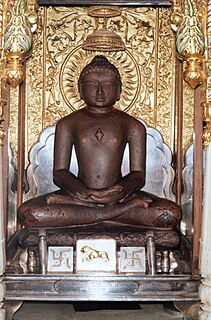The afterlife is the belief that the essential part of an individual's identity or the stream of consciousness continues after the death of the physical body. According to various ideas about the afterlife, the essential aspect of the individual that lives on after death may be some partial element, or the entire soul or spirit, of an individual, which carries with it and may confer personal identity or, on the contrary, may not, as in Indian nirvana. Belief in an afterlife is in contrast to the belief in oblivion after death.

Karma means action, work or deed; it also refers to the spiritual principle of cause and effect where intent and actions of an individual (cause) influence the future of that individual (effect). Good intent and good deeds contribute to good karma and happier rebirths, while bad intent and bad deeds contribute to bad karma and bad rebirths.

Reincarnation is the philosophical or religious concept that the non-physical essence of a living being starts a new life in a different physical form or body after biological death. It is also called rebirth or transmigration, and is a part of the Saṃsāra doctrine of cyclic existence. It is a central tenet of Indian religions, namely Jainism, Buddhism, Sikhism and Hinduism, although there are Hindu groups that do not believe in reincarnation but believe in an afterlife. A belief in rebirth/metempsychosis was held by Greek historic figures, such as Pythagoras, Socrates, and Plato. It is also a common belief of various ancient and modern religions such as Spiritism, Theosophy, and Eckankar, and as an esoteric belief in many streams of Orthodox Judaism. It is found as well in some tribal societies around the world, in places such as Australia and South America.

The bhavachakra is a symbolic representation of saṃsāra. It is found on the outside walls of Tibetan Buddhist temples and monasteries in the Indo-Tibetan region, to help ordinary people understand Buddhist teachings.

The Jardine River National Park is a national park in Queensland, Australia, 2,137 km northwest of Brisbane and about 900 km northwest of Cairns, on the tip of Cape York Peninsula.

Rebirth in Buddhism refers to its teaching that the actions of a person lead to a new existence after death, in endless cycles called saṃsāra. This cycle is considered to be dukkha, unsatisfactory and painful. The cycle stops only if liberation is achieved by insight and the extinguishing of desire. Rebirth is one of the foundational doctrines of Buddhism, along with Karma, nirvana and moksha.

The Bardo Thodol is a text from a larger corpus of teachings, the Profound Dharma of Self-Liberation through the Intention of the Peaceful and Wrathful Ones, revealed by Karma Lingpa (1326–1386). It is the best-known work of Nyingma literature, and is known in the West as the Tibetan Book of the Dead.
Karma is a concept of Hinduism which explains causality through a system where beneficial effects are derived from past beneficial actions and harmful effects from past harmful actions, creating a system of actions and reactions throughout a soul's (Atman's) reincarnated lives forming a cycle of rebirth. The causality is said to be applicable not only to the material world but also to our thoughts, words, actions and actions that others do under our instructions.

"Karma Police" is a song by the English alternative rock band Radiohead, released as the second single from their third album OK Computer (1997) on 25 August 1997. The song charted at number 8 on the UK Singles Chart and at 14 on the US Hot Modern Rock Tracks chart. It was included on the Radiohead: The Best Of (2008).
Prarabdha Karma are the part of sanchita karma, a collection of past karmas, which are ready to be experienced through the present body (incarnation).

Karma is a Sanskrit term that literally means "action" or "doing". In the Buddhist tradition, karma refers to action driven by intention (cetanā) which leads to future consequences. Those intentions are considered to be the determining factor in the kind of rebirth in samsara, the cycle of rebirth.

Karma is the basic principle within an overarching psycho-cosmology in Jainism. Human moral actions form the basis of the transmigration of the soul. The soul is constrained to a cycle of rebirth, trapped within the temporal world, until it finally achieves liberation. Liberation is achieved by following a path of purification.
Fruit and fruitcake, as well as many variations, are slang or even sexual slang terms which have various origins but modern usage tend to primarily refer to gay men and sometimes other LGBT people. Usually used as pejoratives, the terms have also been re-appropriated as insider terms of endearment within LGBT communities. Many modern pop culture references within the gay nightlife like "Fruit Machine" and "Fruit Packers" have been appropriated for reclaiming usage, similar to queer and dyke.

Infamous is an action-adventure video game developed by Sucker Punch Productions and published by Sony Computer Entertainment for PlayStation 3. The game was released in May 2009. In Infamous, the player controls the protagonist Cole MacGrath, a bike messenger caught in the center of an explosion that devastates several city blocks of the fictional Empire City. The explosion sends the city into chaos while Cole finds himself with new electricity-based super powers. Though the game's story follows Cole using his new abilities to restore some semblance of order to Empire City, the player is given several opportunities to use these powers for good or evil purposes in the game's Karma system. These choices ultimately affect character growth, the reaction of the City's populace towards Cole, and finer elements of gameplay and the story.
Dream Yoga or Milam —the Yoga of the Dream State—is a suite of advanced tantric sadhana of the entwined Mantrayana lineages of Dzogchen. Dream Yoga are tantric processes and techniques within the trance Bardos of Dream and Sleep Six Yogas of Naropa.
In the tradition of the tantra, Dream Yoga method is usually passed on by a qualified teacher to his/her students after necessary initiation. Various Tibetan lamas are unanimous that it is more of a passing of an enlightened experience rather than any textual information.
Credit Karma is an American multinational personal finance company, founded on March 8, 2007, by Kenneth Lin, Ryan Graciano and Nichole Mustard. It is best known as a free credit and financial management platform, but its features also include free tax preparation, monitoring of unclaimed property databases and a tool to identify and dispute credit report errors.

According to Jain karma theory, there are eight main types of karma (Prikriti) which are categorized into the ‘harming’ and the ‘non-harming’; each divided into four types. The harming karmas directly affect the soul powers by impeding its perception, knowledge and energy, and also brings about delusion. These harming karmas are: darśanāvaraṇa, Jnanavarniya, antarāya and mohanīya. The non-harming category is responsible for the reborn soul's physical and mental circumstances (nāma), longevity (āyuś), spiritual potential (gotra) and experience of pleasant and unpleasant sensations (vedanīya). In other therms these non-harming karmas are: nāma, āyu, gotra and vedanīya respectively. Different types of karmas thus affect the soul in different ways as per their nature. Each of these types has various sub-types. Tattvārthasūtra generally speaks of 148 sub-types of karmas in all. These are: 5 of jñānavaraṇa, 9 of darśanavaraṇa, 2 of vedanīya, 28 of mohanīya 4 of āyuṣka, 93 of nāma, 2 of gotra, and 5 of antarāya.

Infamous 2 is an action-adventure video game developed by Sucker Punch Productions and published by Sony Computer Entertainment for PlayStation 3 video game console. It is a sequel to the 2009 video game Infamous. Announced on June 4, 2010, the game was released on June 7, 2011.

Karma - Koi Aa Raha Hai Waqt Badalney is an Indian superhero television series series written by Subodh Chopra and directed by Pawan Kaul. The show aired on STAR Plus from 27 August 2004 to 11 February 2005. It was the first ever action-thriller show from the Balaji Telefilms.

Faking It is an American single-camera romantic comedy series that premiered on MTV on April 22, 2014, starring Rita Volk, Katie Stevens, Gregg Sulkin, Michael Willett and Bailey De Young. The series was created by Dana Min Goodman and Julia Wolov. Carter Covington developed the series and serves as the executive producer. An eight-episode first season was ordered by MTV in October 2013. MTV announced a 10-episode second season set to premiere on September 23, 2014. In August 2014, the show won a Teen Choice Award for "Choice TV Breakout Show". In October 2014, MTV ordered 10 more episodes, meaning season two would have a total of 20 episodes. The series features the first intersex main character on a television show, and included television's first intersex character played by an intersex actor.















